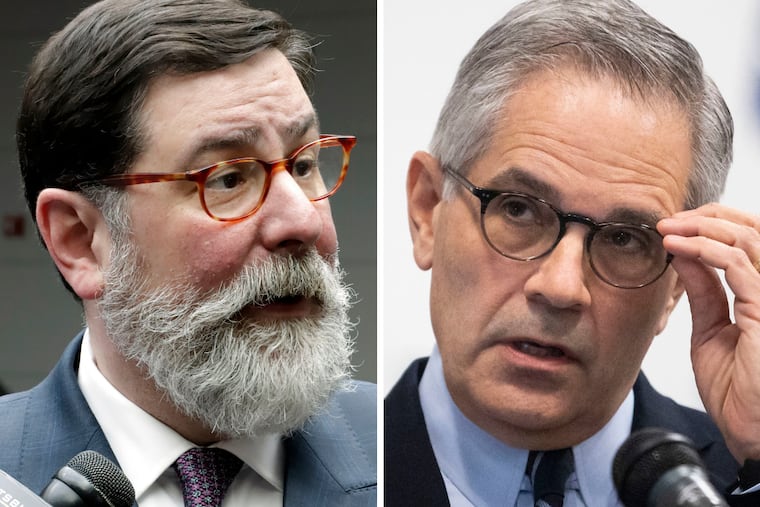Philly and Pittsburgh primaries are referendums on progressive politics | Opinion
On May 18, Pittsburgh has a mayoral primary and Philly, one for District Attorney.

Urban progressivism is on the ballot in Pennsylvania’s biggest cities, where the May 18 primary will measure Democratic voters’ satisfaction with ideological governance.
Seeking a third term as mayor, Pittsburgh’s Bill Peduto could lose reelection for not going far enough as a self-described progressive — particularly on public safety. In Philadelphia, District Attorney Larry Krasner may lose a second term for going too far as a progressive prosecutor amid surging violent crime. The primary, which essentially determines November’s victors in both one-party cities, is “really a test of where Democratic voters are right now,” said Christopher Borick, director of Muhlenberg College’s Institute of Public Opinion.
» READ MORE: 4 takeaways from the only TV debate between Philly DA Larry Krasner and challenger Carlos Vega
In Pittsburgh, Peduto was once applauded as a progressive visionary. In 2013, the then-city councilman ran for mayor on a “new Pittsburgh” platform. Shortly after his 2014 mayoral inauguration, Peduto declared that Pittsburgh — politically controlled by Democrats for nearly a century — had “changed from an old boys’ network city to a progressive city.”
Since then, Peduto’s governance has reflected that leftward shift. As mayor, he has enacted “inclusionary zoning,” embraced inclusive urban development, and vowed a carbon-neutral city by 2050.
But today, Peduto’s reelection isn’t assured. “Peduto has the bona fides of a progressive, but in contemporary Democratic politics, is that enough? There’s your million-dollar question,” said Borick.
As Ed Gainey views it, Peduto’s progressive stewardship has fallen short. Gainey is Peduto’s most competitive opponent among the three Democrats vying for the incumbent’s seat. A state representative since 2013, Gainey would govern to the left of Peduto, who he believes is ineffective on progressive priorities such as the environment, racial equity, affordable housing, and police reform.
In addition to growing support from minority and affluent voters, Gainey has the backing of activist organizations, Democratic socialist state legislators, and the SEIU Healthcare union — a political force in Pittsburgh, where the UPMC medical system, the state’s largest nongovernmental employer, is headquartered. Meanwhile, Peduto has received more traditional Democratic endorsements, including from labor unions, Congressman Mike Doyle, and state Senate Democratic Leader Jay Costa.
Gainey, who has criticized Peduto for “overpolicing” in neighborhoods, has made a pledge to “redirect” police funds to social services. But Peduto has defended his record on progressive criminal-justice reforms, including the reallocation of $5.3 million in the police budget to community programs. Earlier this year, however, Peduto did refer to last summer’s protesters as the “radical left” (he later apologized). The mayor, moreover, has stated that most police officers are “good people” and that he opposes defunding their department. Violent crime in Pittsburgh has increased by 90% from this time in 2020.
Five hours east, voters’ tolerance for progressive policies on criminal justice and public order appears to be fading. In Philadelphia, 499 people were killed in 2020 — the city’s second-highest total in 60 years. As it stands, the present homicide rate could break the all-time record.
» READ MORE: How Philly, the nation’s most supervised big city, cut its probation numbers by a third
This intensifying dysfunction, the start of which preceded the pandemic, has affected different Philadelphia neighborhoods and led to tragic outcomes.
Philadelphia residents have lambasted Mayor Jim Kenney for his leadership amid the public-safety crisis. Previous mayors, such as Ed Rendell in the 1990s or Michael Nutter in the early 2010s, emphasized law and order.
But it’s Krasner, the district attorney, whose left-wing approach to law enforcement is on the ballot this month. A former civil rights defense attorney who once called law enforcement “systemically racist,” Krasner has worked to transform the DA’s Office since being elected in 2017. He has vowed to eliminate cash bail, enacted decriminalization measures — including for shoplifting under $500 — supported de-carceration, and sent gun offenders to diversionary programs.
Krasner’s Democratic primary opponent, Carlos Vega, is a Bronx-born former assistant DA who was recruited by Rendell in the 1980s and is supported by police unions. In 2018, Krasner fired Vega, along with 30 other staffers. Now, as Vega puts it, he is running because of Krasner’s “failure to address violent crime, and his reckless approach to reform has made Philadelphia more dangerous today than before he took office.” The city’s Democratic Party has declined to endorse in the DA’s race, and Kenney recently dodged making an endorsement of Krasner. “I think people need to make up their minds as to what they should do,” he told Philadelphia’s ABC affiliate.
Indeed, Democratic voters in Philadelphia and Pittsburgh will soon issue a verdict on progressive politics.
Charles McElwee is editor of the public affairs page on Pennsylvania for RealClear, where a version of this piece first appeared. He is the 2020-21 John Farley Memorial Fellow, part of the Fund for American Studies’ Robert Novak Journalism Program. @CFMcElwee.